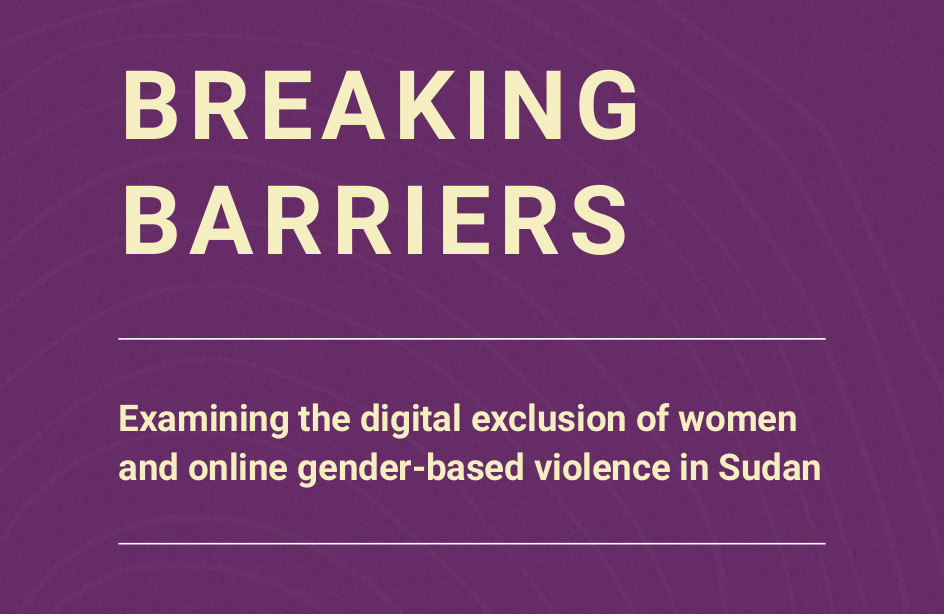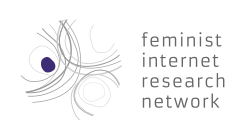Breaking Barriers: Examining the digital exclusion of women and online gender-based violence in Sudan

In light of Sudan's volatile and conflict-affected political, economic, and social context, this study examines the barriers that hinder women from accessing the internet. In this research, we argue that women's access to the internet, freedom of expression, and active participation in technology are not limited to infrastructure issues, yet barriers include social, cultural, and political factors at both the national, and the international level.

In a globalised world where the internet transformed our earth into a small village, the global South is left lagging. Internet accessibility remains a major hurdle facing a large proportion of people in the global South. The situation in Sudan is no exception. In the light of the economic instability, political turmoil and the United States-led economic sanctions imposed on Sudan, internet accessibility and making beneficial use of the internet are a real challenge, especially for women. This research explores the barriers to women’s access to and use of the internet in Sudan. It examines how intersectional discrimination against women resulted in their digital exclusion in the four regions of Khartoum, Port Sudan, North Darfur and South Kordofan. The interplay of economic deterioration, political instability, economic sanctions, gender dynamics and power dynamics has widened the gender digital divide in the country. Digital inequality is further amplified by limited access to digital technologies, lack of skills, and affordability. The research also draws attention to the online gender-based violence (OGBV) experienced by the women as a significant barrier to internet access as also unrecognised and unaccounted for violence and hate speech against them.
Key findings
- Among the various barriers to women's access and use of the internet, our research findings reveal that the following are noxious and prominent – social construct of gender norms, power dynamics, personal status law, government regulations, lack of gender-sensitive regulations, OGBV, and US sanctions against Sudan.
- Connected to the above, particularly in the private sphere, access to the internet mostly involves domestic violence which can sometimes entail murder. Young girls are forced to be supervised by family members, who in most cases are males. Married women are also being watched by their husbands online, which often results in divorce, beatings, and/or other types of abuse.
- All the four regions mentioned above reported the prevailing culture of men’s control over women over owning technological devices and accessing the internet. A majority of the research participants pointed out that women of different ages, social classes, ethnicities, marital status, and locations (urban and rural) are challenged by men’s control over their lives to access and use the internet. In some rural areas in Khartoum, South Kordofan and North Darfur, it was reported that women are prevented from having a smartphone or accessing the internet because men believe it changes the behaviour and attitudes of women and girls in a way that does not conform to the community culture.
- A majority of women do not feel safe in online spaces, according to the focus group discussions (FGDs). The data collected through the FGDs shows that many women are not allowed to freely express their opinions on social media or share their photos. To circumvent this, they create accounts with nicknames or pseudonyms to avoid recognition by their family members online. Furthermore, the research participants reflected that women experience different types of OGBV, including bullying, sexual harassment, blackmail and threats. These acts have limited the activities of some women in online spaces, and driving others to discontinue their online presence. Moreover, women’s struggles with OGBV in Sudan usually extend offline also.
- In South Kordofan (Kadugli, capital city), the problem women face is internet shutdown due to the ongoing intercommunal conflicts. FGD participants said they were neophytes when it came to the internet and its usage and that they struggled to create content due to government surveillance and restrictions on freedom of expression across the country; and there were women who have been imprisoned for expressing their opinion online.
- The research also shows that certain groups of women are more targeted on social media. Intersecting factors including age, ethnicity, socioeconomic class, occupation, physical appearance, physical/mental ability, and nature of activities on social media were recorded as playing a role in how they are more vulnerable to OGBV and less likely to obtain justice. For instance, younger women political activists who come from marginalised ethnic groups are more vulnerable to OGBV. Furthermore, a majority of the victims refrain from filing a formal complaint for various reasons, including, primarily, social stigma as well as lack of awareness about their rights and lack of trust in the juridical system. Exacerbated by the sanctions, the variety of settings and tools to address online abuse are not always easy to access.
- The US trade embargo on Sudan has affected mobile network operators' access to crucial technologies to maintain telecom infrastructure. This leads telecom operators to buy equipment and software through third-party companies, which directly increases cost of operation because these entities in turn inflate their prices by two times, impacting the internet bundle cost in a country that sees a high rate of poverty among women.
- Although the Berman Amendment (which stipulates that transactions involving information and informational materials are generally exempt from the purview of the US presidential regulation) offered individuals the right to access information and informational materials, still some educational websites block sanctioned countries from accessing their educational materials. Most edutech services do not accept payment through Visa or Mastercard issued in Sudan. This has exacerbated the restrictions and control women endure to access education online, as well as decreasing livelihood opportunities through finding jobs online.
- Sanctions are directly affecting Sudanese women in STEM (science, technology, engineering and mathematics), and marginalising them professionally. Getting access to certifications is not easy and is very costly as Sudanese must travel abroad to sit for exams, and this is not always affordable and/or permissible to many pursuing STEM- related professions. Additionally, sometimes training centres and examiners may refuse to allow them to sit for the exams as Sudan is under sanctions.
Key recommendations
The lack of accessibility to the internet and the phenomenon of OGBV against women in Sudan require collective effort at the community, national, and international levels. This research proposes several recommendations based on evidence that emerged during the focus group discussions (FGDs), where data was collected and analysed. However, in order to increase the literacy rate and digital literacy in Sudan, the Sudanese Government must end the military regime and the ongoing conflicts, establish a citizen-led government and introduce policies that stabilise the falling economy with the support of regional and international communities. The judiciary, on its part, must work on drafting and updating laws, including 1) reforming all laws that discriminate against women, including the Criminal Act, Evidence Act, Cybercrime Law, Personal Status Law, and Labour Code, among others, 2) enacting a law criminalising both offline and online GBV, and 3) streamlining the filing of complaints against OGBV to encourage victims to report and ensure they have access to free legal representation.
The telecom authority needs to work collaboratively with legal institutions to support in the development of electronic evidence guidelines that allow the juridical system to follow the digital footprints of online crimes. The Ministry of Social Affairs must appoint a gender focal point in all entities, especially at the telecom authority. Gender focal points must collaborate with the telecom authority to develop policies and strategies that can close the gender digital divide, and create a safe environment for women online. The gender focal point must also work closely with the juridical system in collecting electronic evidence of OGBV cases and follow up on the implementation of policies developed to close the gender digital divide.
Social media companies must be governed by a law that forces them to activate reporting mechanisms against online perpetrators, as well as provide reports as per judicial orders to serve as evidence in courts of law to help victims get justice. It is worth noting that all major social media platforms, such as Facebook, Twitter, Instagram, LinkedIn, etc., are US- based – and Sudan, like the rest of the world, has problems with the way data is handled, along with censorship and privacy concerns. Sudan has an added layer of grievance against the US and that is the sanctions, and the international community must work on ending this sanctions regime as soon as possible. The US must work on revising how targeted sanctions are implemented without hindering the process of due diligence followed by American companies to grant access to services and products. Research suggests that these companies usually get overwhelmed by the due diligence process, and end up either terminating services provided or not granting them to individuals or institutions in the first place. Thus, the international community must also work on introducing a binding international mechanism to govern the internet in terms of access and usage without political interference that would restrict citizens' access to technologies used for meaningful use of the internet. Finally, further research must be conducted in Sudan and other countries affected by the sanctions to analyse the impact of sanctions on the gender digital divide and women's digital rights.
Study limitations
The FGDs were covered only in four states due to the limited resources and the time frame of the project. However, sampling was adjusted based on existing and emerging circumstances; some localities with high numbers of women in need remained inaccessible due to outbreaks of dengue fever at the time of data collection, armed conflict in the Blue Nile State, and inaccessibility of non-government-controlled areas. Furthermore, researchers faced challenges to physically accessing South Kordofan and Port Sudan, as such visits could risk exposure by the authorities represented by the Humanitarian Aid Commission or the General Intelligence Service on the ground.
Let alone OGBV, GBV itself is underreported and rarely discussed openly. Several GBV issues are normalised in Sudan, such as female genital mutilation (FGM), domestic violence and marital rape; so FGDs addressing OGBV may fail to bring to light many cases and underlying concerns. It would be very difficult for women to speak openly about their personal experiences with GBV and OGBV for fear of social stigma and shame and that they might be reported to their families. Reporting and tracking OGBV has many challenges such as safety and protection upon disclosure, capacity to collect and analyse data, and identifying and accounting for bias in data sources, etc. It was difficult to find survivors of OGBV who were able to raise a legal case; this is because many women are unaware of the nature of the crime and cybercrime law, and not encouraged to seek justice due social pressure, financial burden, or the fear of not getting justice at all. Therefore, this study comes with the limitation on how women were able to seek justice against OGBV perpetrators.
Although the literature review has discussed the impact of the sanctions on women, it had limitations on the discussion about the impact of these sanctions on women's digital rights. Women's lack of understanding of the topic also would have impeded their ability to participate and reflect during the FGDs. Findings in this report and of the frequency analysis must be read keeping these factors in mind. This research explored opportunities and challenges in a limited way, due to continuous changes in the political scene. It was conducted prior to the ongoing war, and does not reflecting the exacerbated challenges women face in accessing their digital rights during this conflict.
